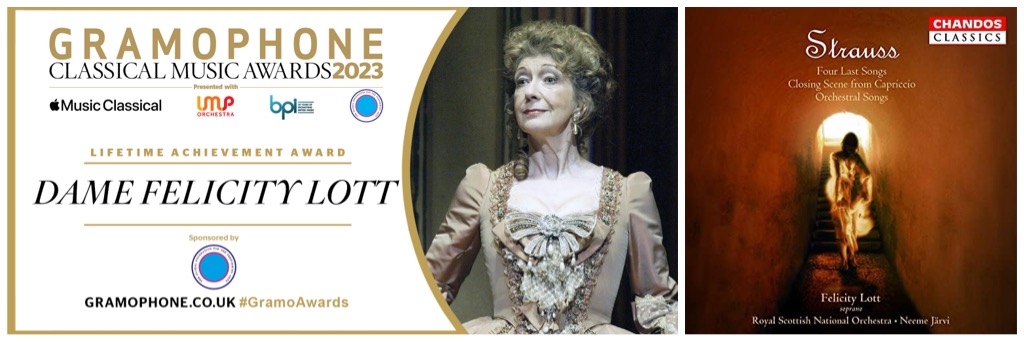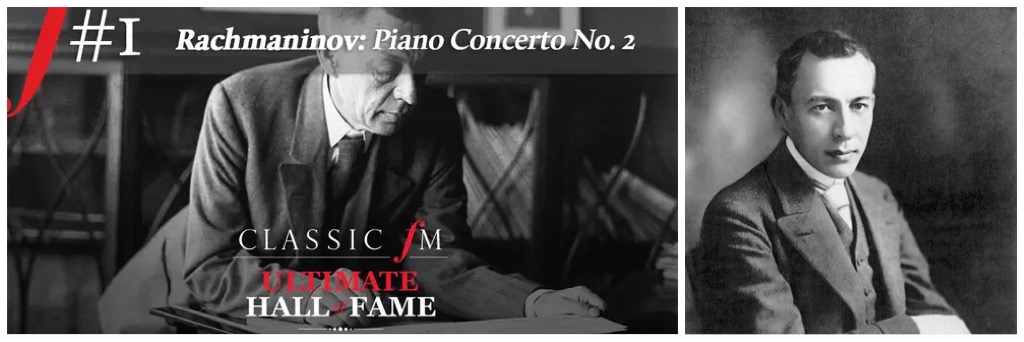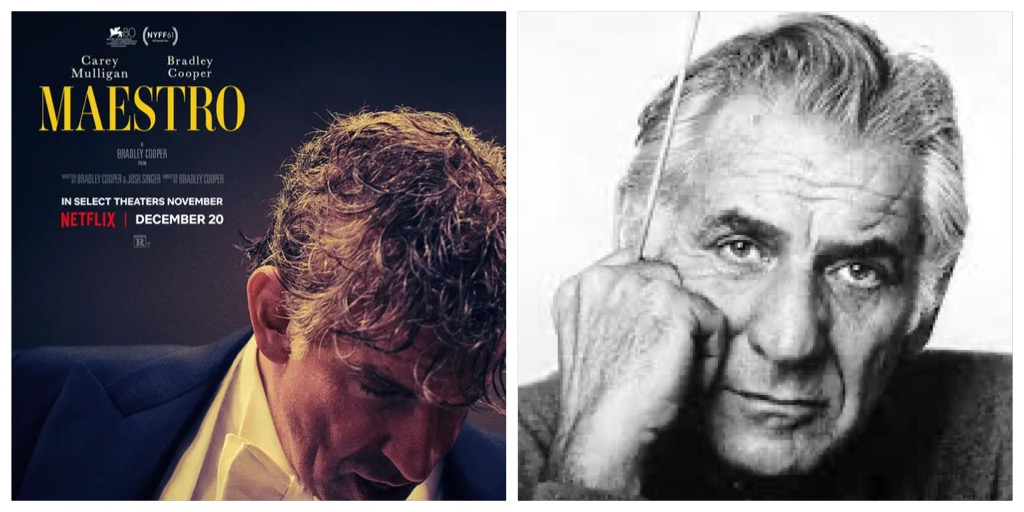It’s the last few days of 2023 so a good time to look back and highlight a few musicians who had a great year. Movie premieres for Joseph Bologne and Leonard Bernstein, Best Classical Artist for Ludovico Einaudi, a richly-deserved Gramophone Lifetime Achievement Award for the soprano, Felicity Lott and Sergei Rachmaninov hits the Classic FM Hall of Fame No 1 spot for his glorious Piano Concerto No 2. Plenty to celebrate for these artists and all the other musicians who were recognised for their contribution to the world of classical music
Movie Premiere 2023
Joseph Bologne, Chevalier de Saint-Georges (1745 – 1799)
Symphony in G Major Op.11 III. Allegro assai
Tafelmusik Baroque Orchestra
Jeanne Lamon (Director)
Gramophone Magazine Lifetime Achievement Award 2023
Felicity Lott (soprano)
Richard Strauss (1864-1949)
Four Last Songs III. Spring
Royal Scottish National Orchestra
Neeme Järvi (conductor)
Best Classical Artist at the Global Awards 2023
Ludovico Einaudi (piano)
Stella del Mattino
Classic FM Hall of Fame No 1 2023
Sergei Rachmaninov (1873-1943)
Piano Concerto No 2
Artur Rubinstein (piano)
Chicago Symphony Orchestra
Fritz Reiner (conductor)
Movie Premiere 2023
Maestro – Leonard Bernstein (1918-1990)
Overture Candide
London Symphony Orchestra
Yennick Nezet-Seguin (conductor)

Joseph Bologne had an astonishing life. He was the first successful Black classical composer; champion swordsman of all Europe; colonel of his own regiment which fought in the Revolution; virtuoso violin soloist; survivor of a slave revolt in the Caribbean; confidant and companion to Marie Antoinette; conductor of famed orchestras and patron to Josef Haydn. Despite racial attitudes and traditions of Royal France, he became a respected member of the lower nobility and intellectual and artistic circles of France.
Born on Christmas Day on the Caribbean island of Guadeloupe in 1745, the son of a wealthy planter and a slave he was taken with his mother to France, where he had the best education, trained with one of France’s best fencing masters and 21 was the best swordsman in France. He engaged in serious music study by the age of 27, he was busy as a virtuoso violin soloist, performing his own concertos and developing career as a conductor. His compositions include 12 violin concertos, string quartets (among the first in France), 10 symphonies concertantes and works for the stage including operas. He commissioned Haydn to compose his famous “Paris” Symphonies (c.1785) and by the beginning of the French Revolution he had continued his career as premier swordsman and became involved in the Revolution. He was named the colonel of his own regiment in the National Guard, imprisoned during the Reign of Terror but resumed his command after the death of Robespierre.
After the Revolution he went back to the Caribbean and for two years given up for dead. He resurfaced, travelled back to Paris, and resumed his acclaimed career as a conductor until his illness and death in 1799. The two opus 11 symphonies were most likely composed in the middle 1770s, when the composer was around thirty years old. They are almost perfect textbook examples of Rococo style with simple textures, harmonies, and balanced, phrasing that characterised the steps to the classic style of mature Haydn, Mozart and early Beethoven.

Dame Felicity Lott one of Britain’s best-loved sopranos. In opera, her portrayals of the Strauss and Mozart roles in particular have led to critical and popular acclaim worldwide. Her concert engagements have taken her to the major orchestras, working with Sir Simon Rattle, Bernard Haitink, Mehta, Previn, Masur, Welser-Möst, Sawallisch and Sir Andrew Davis. Much of her concert and recital repertoire is recorded, as are many of her great operatic roles.
A founder member of The Songmakers’ Almanac, Felicity Lott has appeared on the major recital platforms of the world and in June 2005 she celebrated the 30th anniversary of her recital debut at the Wigmore Hall, with whom she has a particularly close association. She received the Wigmore Hall Medal in 2010 for her exceptional contribution to the hall.

Italian pianist and composer, Ludovico Einaudi trained at the Conservatorio Verdi in Milan and began his career as a classical composer. However, he soon incorporated other styles and genres such as pop, rock, folk, and world music. His music is ambient, meditative, and often introspective, drawing on minimalism and contemporary pop. Einaudi has composed scores for film and television productions and his music was used as the score for the Golden Globe and Academy Award-winning films Nomadland and The Father. He has released a number of solo albums for piano including a seven-part project named Seven Days Walking, released over seven months in 2019.
Born in Turin, his father was a publisher while his paternal grandfather, Luigi Einaudi, was President of Italy between 1948 and 1955. At the heart of his music, Einaudi builds his pieces using the technique of repeating patterns and steadily shifting layers, as championed by minimalist composers such as Steve Reich and Philip Glass in the latter half of the last century.
A master of fusion, Einaudi has combined post-minimalism with the simple chord progressions of popular music, finally adding the warm ambience of relaxation music to produce his own identifiable style. It is music calculated to shift mood and can prove blissfully soothing to the listener. At a time of frantic change, his repetitive musical ideas have proved equally compelling for performers and listeners alike.

Rachmaninov’s Piano Concerto No. 2 in C Minor, Op. 18, was premiered on November 9, 1901 and became known worldwide part of the 2nd movement was set as the background music for David Lean’s 1945 film Brief Encounter. This concerto saved Rachmaninoff’s compositional career. In 1897, the premiere of his Symphony No. 1 had gone badly, victim of the fact that the conductor, Alexander Glazunov, was highly intoxicated that evening. Reviews of the performance, and the symphony itself, were so cruel that Rachmaninoff, finding himself crippled with writer’s block, swore off composition in favour of piano performance.
Rachmaninoff eventually found the courage to compose and completed a new concerto, the No. 2 in C Minor. Its premiere was given to great acclaim in Moscow on November 9, 1901, with the composer himself as soloist. As of 2023, more than 300 recordings of the Piano Concerto No. 2 in C Minor exist. Rachmaninoff himself recorded the concerto playing with Leopold Stokowski and the Philadelphia Orchestra in 1929.

Leonard Bernstein, conductor, composer, and pianist famous for his accomplishments in both classical and popular music. Alaso well-known for his flamboyant conducting style, and for his flair as a teacher, especially in concerts for young people. He studied conducting with Fritz Reiner and orchestration with Randall Thompson; and the Berkshire Music Center at Tanglewood, Massachusetts, where he studied conducting with Serge Koussevitzky.
In 1943 Bernstein was appointed assistant conductor of the New York Philharmonic after substituting for the conductor Bruno Walter. His technical self-assurance under difficult circumstances and his interpretive excellence made an immediate impression and marked the beginning of a brilliant career. In 1953 he became the first American to conduct at La Scala in Milan.
From 1958 to 1969 Bernstein was conductor and musical director of the New York Philharmonic, becoming the first American-born holder of those posts. His popularity increased through his appearances not only as conductor and pianist but also as a commentator and entertainer. Bernstein explained classical music to young listeners on such television shows as Omnibus and Young People’s Concerts. After 1969 he continued to write music and to perform as a guest conductor with several symphonies throughout the world.
As a composer Bernstein made skilful use of diverse elements ranging from jazz to biblical and jewish liturgical themes. In 1989 he conducted two historic performances of Ludwig van Beethoven’s Symphony No. 9 in D Minor which were held in East and West Berlin to celebrate the fall of the Berlin Wall.
